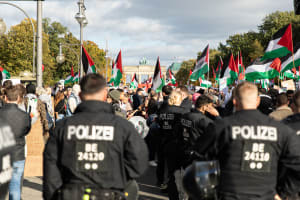The story behind ‘HaTikvah’: Israel’s national anthem

The words seem timeless and the melody ancient, but the song “HaTikvah” (“The Hope”) was only made Israel’s national anthem relatively recently, in 2004. However, it had been around much longer than that. What took them so long to make it official?
The song was penned in 1886 by a controversial character named Naphtali Herz Imber. Imber’s bohemian lifestyle raised eyebrows, while his lyrics were considered not religious enough for some and too religious for others. Even Theodore Herzl, father of the Zionist movement, didn’t like it. It was eventually chosen as the anthem of the movement at the 18th Zionist Congress in 1933, but it would be another 70 years before it became Israel’s national anthem.
Imber was a Jewish poet from Złoczów, a town in the Austro-Hungarian region of Galicia, located within present day Poland and Ukraine. He wrote the first version of the poem, which was nine stanzas long, while in Romania in 1878. It was initially known as “Tikvatenu” ("Our Hope") was inspired by the Hibbat Zion ("Lovers of Zion") movement of early Zionism, which sought to increase Jewish settlement in the Land through agriculture.
While Imber wandered around Eastern Europe and ended up in Ottoman Palestine, South African born Laurence Oliphant was also traveling the world before ending up in Haifa, northern Israel. Imber became the personal secretary and tutor to Sir Oliphant, who turned out to be a very enigmatic figure and friend to Imber.
According to Britannica, Oliphant was convinced that the establishment of a Jewish state was a matter of “fulfilling prophecy and bringing on the end of the world,” and his mystical beliefs, a heady mixture of spiritualism and apocalyptic Christianity, motivated him to encourage Jewish pioneers back to the land of their forefathers in the 1880s.
Due to Oliphant’s enthusiasm for Zionism, Imber dedicated a collection of his poetry including “Tikvatenu” to the eccentric statesman. The poem was first published in this 1886 collection entitled “Barkai,” ("Morning Star") in Jerusalem.
Imber left Palestine in 1888, by which time his poem had become a song thanks to pioneers from the Zionist farming community of Rishon-le-Zion. According to MyJewishLearning, the melody was added by a Romanian Jewish immigrant named Samuel Cohen, who adapted it from a Moldavian folk song, “Carul cu Boi” ("Cart and Oxen"). However, the fact that it closely resembled a musical theme in Bedřich Smetana’s “Moldau” caused some controversy, since there were objections that it wasn’t a Jewish piece of music.
The melody wasn’t the only problem. Herzl disliked the song so much he launched multiple competitions inviting people to come up with an alternative. He didn’t approve of Imber who was described as a “vagabond, a drunkard, and a Hebrew poet” in that order, and died impoverished and early due to his alcoholism.
When it came to the words of the song, some felt it was too secular – not mentioning God once – while socialist Zionists disliked its biblical references to God’s promises of return to the Land. Alternatives were proposed by Rabbi Abraham Isaac Kook (to focus more on faith) and Hayim Nahman Bialik (to focus more on the power of the pioneers). But despite many misgivings, “Hatikvah” quickly became very popular in the early decades of the Zionist movement. Imber’s song was sung each year at the annual Zionist Congresses, and by the 18th Zionist Congress in 1933, it was officially chosen as the movement’s anthem, along with the now-famous flag of Israel.
Although it was sung as an expression of hope and resistance in the years of terrible persecution leading up to1948, it was surprisingly not chosen as the anthem at the reestablishment of Israel. It would be another 56 years before HaTikvah became Israel’s official national anthem in 2004.
Clearly, not everyone who calls Israel ‘home’ is Jewish, approximately one in five are Arab, but the song of return to Zion speaks of the broad biblical promise, that God would reestablish Zion and Jerusalem. The lyrics had to be tweaked a little after the state was finally established. Previously the longing to return was emphasized, but today we sing, “a free people in our land,” reflecting the fact that the Land of Israel is finally back in the hands of the people of Israel, fulfilling the hope of 2,000 years.

Jo Elizabeth has a great interest in politics and cultural developments, studying Social Policy for her first degree and gaining a Masters in Jewish Philosophy from Haifa University, but she loves to write about the Bible and its primary subject, the God of Israel. As a writer, Jo spends her time between the UK and Jerusalem, Israel.
You might also like to read this:

















